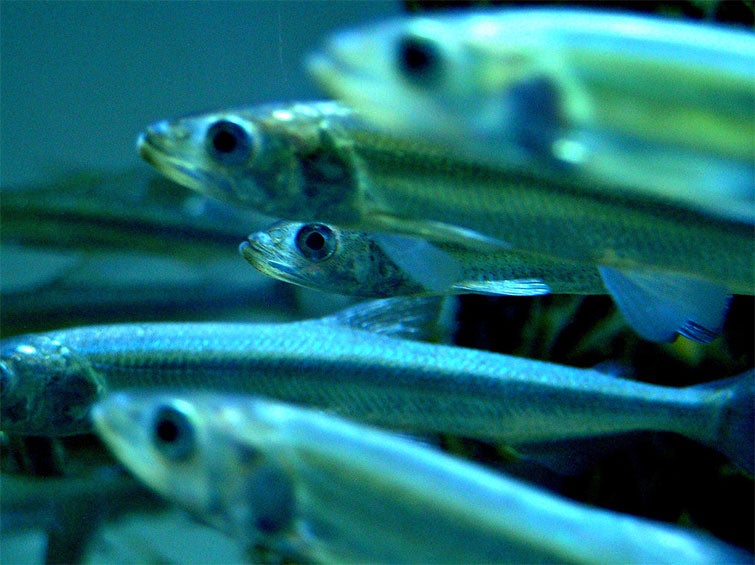Federal Court Ruling Will Protect Atlantic River Herring and Shad
Victory
—Victory for fishermen and conservation groups in battle with unsustainable industrial trawling
Contact
In a court decision late Friday, U.S. District Court Judge Gladys Kessler found that the National Marine Fisheries Service (NMFS) has failed to take required action to address the catch of severely depleted populations of Atlantic river herring and shad populations by the New England industrial herring fleet.
Atlantic (sea) herring is the most important forage fish in New England and a critical link in the ocean ecosystem. (NOAA)
The court found that a Fisheries Management Plan must protect all stocks that “require conservation and management” and may not unreasonably delay making such decisions. The court also found that the service failed to minimize bycatch in the herring fishery.
Atlantic (sea) herring, river herring and shad are critical components of the ocean and coastal ecosystem. Often referred to as “forage fish”, they are the most significant source of food for a variety of commercially valuable fish like cod, sought after sport fish like striped bass and tuna, and countless birds and mammals. Since 1985 there has been over a 90 percent decline in river herring populations. Shad is a separate fish species and similarly threatened.
“The industrial midwater trawl fishery is unsustainable. Without adequate protections in place, New England commercial and recreational fishermen are losing businesses and a way of life they’ve worked their whole lives for,” said Roger Fleming, Earthjustice attorney who represented the coalition in court. “Now federal fisheries managers will be required to protect fish at the bottom of the food chain which will lead to healthier oceans, rivers, and fisheries for everyone.”
Lead Plaintiff Mike Flaherty of Wareham, Massachusetts, said, “Recreational fishermen have been sacrificing for years to bring back river herring but when these fish are in federal waters it’s open season on them by industrial trawlers. With this ruling, this industry will finally need to play by the same rules as the rest of us.”
This court decision is the result of a lawsuit filed in April 2011 by a coalition of recreational anglers and charter-boat fishermen, and conservationists. NMFS must now be required to protect river herring, and reconsider catch limits, bycatch regulations, and accountability requirements across the Atlantic herring fishery.
“The science is clear. Atlantic herring and mackerel fisheries are being decimated by midwater trawlers indiscriminately scooping up depleted river herring populations as senseless bycatch,” said Rob Moir of the Ocean River Institute. “When river herring migrate from rivers to spend seven years in the Gulf of Maine the impacts of these particular mega-midwater trawlers are acute. The result is fewer river herring in our watersheds.”
Judge Kessler’s decision is also noteworthy for making clear, contrary to NFMS assertions in court, that recreational and charter boat fishermen have a stake in how forage species like herring are managed because they are the food for the fish they catch.
“The fall fishing season my business depends on was abruptly wiped out because a fleet of midwater trawlers moved onto our fishing grounds and stripped away all the bait fish in a matter of hours,” said Captain Alan A. Hastbacka, who owns and operates a striped bass charter fishing business out of Chatham. “The giant trawlers need to be reined in. This decision will protect the small businessmen who pump millions of tourist dollars into the New England’s economy every year.”
Background:
On April 1, 2011, Fishermen and river herring advocates challenged NMFS for failing to protect sea herring, river herring, and shad from New England’s industrial Atlantic herring fishery as required under Amendment 4 to the Atlantic Herring Fishery Management Plan.
Amendment 4 was intended to end overfishing through new science-based catch limits and measures to bring accountability to fisheries. Amendment 4, however, fell woefully short of the law and NMFS’s own guidelines for the new requirements. It failed to address river herring and shad at all, even though hundreds of thousands of pounds of these fish are caught, landed and sold in the fishery annually.
All of these fish populations have been hit hard by the emergence in recent years of an industrial midwater trawl fishing fleet that remains severely under-regulated. These industrial trawlers are up to 165 feet long and have the power to catch an entire run of river herring with a single haul of a net. When sea herring are detected, these ships often descend in packs and can strip mine an entire section of the ocean of fish—including river herring, shad and other species—in a matter of hours.
NMFS is the federal agency charged with managing our nation’s ocean fish in federal waters—typically those more than three miles off the coast—in accordance with the Magnuson-Stevens Act. River herring and shad spawn in state waters rivers and streams but generally spend the majority of their lives in federal ocean waters. River herring populations are so severely depleted, NMFS recently began a one year scientific study to determine if they should be listed for protection under the Endangered Species Act.
In September 2010, Earthjustice filed a separate lawsuit on behalf of the Martha’s Vineyard/Dukes County Fishermen’s Association and Michael S. Flaherty against the National Marine Fisheries Service and the Atlantic States Marine Fisheries Commission seeking development of a federal fishery management plan that would protect and help restore river herring and shad populations.

Additional Resources
About Earthjustice
Earthjustice is the premier nonprofit environmental law organization. We wield the power of law and the strength of partnership to protect people's health, to preserve magnificent places and wildlife, to advance clean energy, and to combat climate change. We are here because the earth needs a good lawyer.